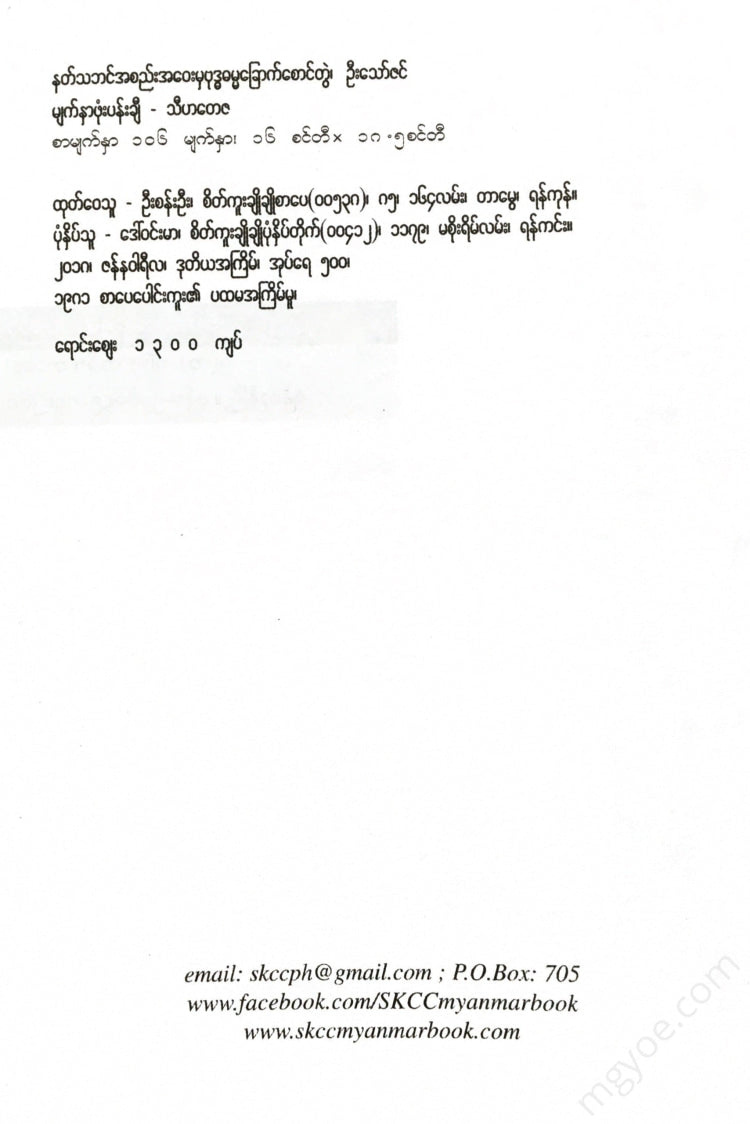စိတ်ကူးချိုချိုစာပေ
U Thaw Zin - Six Books of Buddhist Dhamma
U Thaw Zin - Six Books of Buddhist Dhamma
Couldn't load pickup availability
A collection of six Buddhist texts from the divine assembly
Great festival
At that time, Atanataka
Kuvera and Yaksha
Mahiddhita, the great sage
Devayakkha, Satagiri
What kind of gods and monsters are there?
The three noble ladies are honored.
With a palm-sized fist,
With joy and kindness
Faith is joyful, obedient, and joyful.
The monster's teeth are made of clay.
The moon is the highest (2)
The Sixth Sanghayanatin Pitaka, the Digha Nikayavin Sutta, the Pitaka, the Mahavagga, the Pali Mahasamaya Sutta, in the Burmese translation, Mahasamaya is translated as the assembly of gods. The assembly of gods is actually a great festival of gods. Here, the six books of the Buddha Dhamma are taken together and called the Mahasamaya. In this way, the meaning is made more profound and the path to studying the six important books of the Buddha Dhamma is opened.
Rohini River
The reason for the occurrence of the Mahasamaya Sutta, also known as the Great Festival of the Gods, is related to the Rohini River, which is located between the Kapilavattva and Koliya kingdoms. Therefore, it is worth first focusing on the relationship between those two countries and the Rohini River.
The land of Kapilavatthu (Kapilavatthu) was the ancient capital of the Saktan Empire. That land is now called "Nagarkhat".
Sakta is a region in the Himalayas, located in the Indian state of Nepal, and is located between the Kosala region to the west and the Malla region to the east, in the eastern part of the Ayodhya region , between longitudes (82') and (84) degrees north, and latitudes (26) and (28) degrees east.
The travelogues of the Chinese monks Fa Hsien and Hui Ying Tsang state that the ancient site of Kapilavatthu is located 13 miles northwest of Lumbini Park and near a lake north of Kaulli Hawa. This is in fact the same place as Nagarkhasa.
The land of Koliya is the place where Lord Shiva, who was blessed with wealth and prosperity, was born. That land is now called “Amma Kohil.” The land of Koliya, which is called Amma Kohil, is located more than (11) miles east of Kapilavat.
The cities founded by the Sakyan kings were (1) Kapilavattaya, (2) Koliya, (3) Devadaha, (4) Pashu, and (5) Maurya. Of these five Sakyan kingdoms, Koliya was the second city founded.
The Rohini River is located between the Kapilavatthu and the Koliya Rivers. This river is a tributary of the Asiravati River, now called the Rapti. The Rohini River is now called the "Kohan". The Koliya River is located on the eastern bank of the Rohini River, and the Kapilavatthu is located on the western bank of the river.
River water problem
The Rohini River, which lies between the Kapilavattva and Koliya countries, has two forks like a fish's tail. Because it has two forks like a fish's tail, the river is called Rohini, which means fish. The Rohini River can be called the Fish River in Burmese. If one of the two forks of the river is blocked, a lot of water comes out on the other side and enters the fields. At that time, in the month of Nayon, the rice plants did not get enough water and the rice fields withered, so the farmers in those two countries gathered.
Koliya: "If you take this water from both sides, it will not be enough for you and us. Our rice plants will grow well if they drink enough water even once. So please give us this water."
Kapilavatthu: "If your barns are full of grain, should we go around your gates carrying gold, silver, and gold, carrying baskets, etc.? Our rice plants will also thrive if they drink enough water just once. Therefore, give us water."
Both the Koliyas and the Kapilavastu wanted only water. It was not possible to divide all the water equally. It would be useless for both sides. If one side did not take it, the other would have enough water. But neither side would compromise. They did not want gold and silver, they wanted only water. Thus, the peace conference turned into a stalemate.
Koliya: "You are proud of the kings of Kapilavatt. Your kings of Kapilavatt are no match for dogs and pigs. They marry their own sisters. We do not care about the elephants, horses, armies and weapons of those beasts of burden."
Kapilavatthu: "Do you boast of the Anuva kings? Your Koliya kings are Anuva. They have no place to live, so they live in the hollows of the Kala tree. We do not care at all about the elephants, horses, armies and weapons of those Koliya kings."
Thus, the peace conference became increasingly tense. The words that the peasants exchanged were more widely spread and reached the ears of the rulers on both sides. As the words heard at one level were often more offensive, the rulers became bitter and resentful.
The Kapilavatt kings, shouting, "Let us show our courage by marrying our siblings," prepared their weapons and set out.
The Koliya princes also said, "Stay at the top of the mountain."













